
All categories
Featured selections
Trade Assurance
Buyer Central
Help Center
Get the app
Become a supplier

(3500 products available)























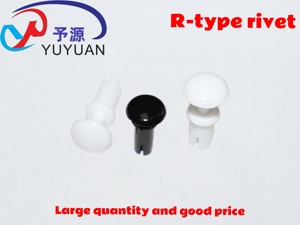
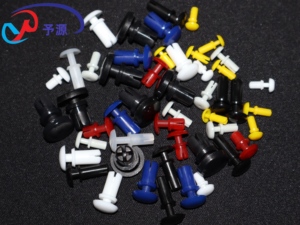


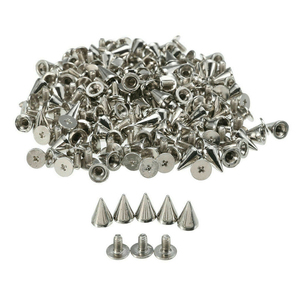



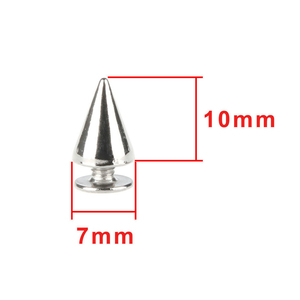
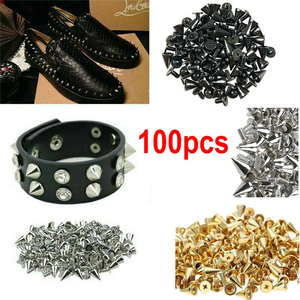


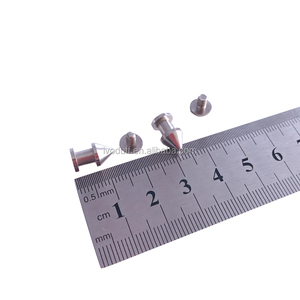
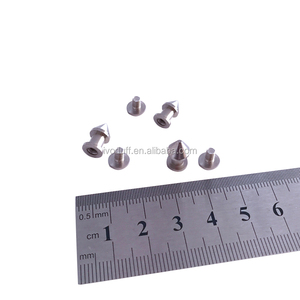






Rivet spike studs are thus developed in various forms for each and every performance. Hence, it helps to understand the diverse kinds of rivet spike studs to decide well on the requirements to ensure the desired outcome.
Metal rivet studs are manufactured using tough materials like steel, brass, or aluminum. This makes them ideal for applications that need strength, and durability, for example, heavy machinery construction, automotive components, or structural applications.
In the case of plastic rivet studs, their production is done using lightweight but tough materials like nylon or polypropylene. Their characteristic of being corrosion and chemical-resistant makes them so useful to electrical components, automotive interiors, and areas where metal conductivity is undesirable.
Decorative rivet studs are designed to add aesthetic value and are commonly used in fashion goods such as clothing, bags, footwear, and accessories. They are available in various sizes, shapes, and designs, such as spikes, studs, or rivets, to give a stylish and noticeable appearance in the designs.
The performance criteria of heat-resistant rivet studs are based on their ability to endure high-temperature environments. These are manufactured with inspection-grade materials such as titanium, certain alloys, and other high-performance plastics. These are fitted into machinery used in the oil, gas, and chemical sectors, which function under severe temperature states.
Aerospace rivet studs are manufactured in compliance with stringent quality and performance standards for airplane construction. They are lightweight but strong enough to provide the required mechanical fixation without increasing weight. These rivets are mainly for aircraft components.
The durability for rivet spike studs is further extended with the diverse materials used in their manufacture. Tough and abrasion-resistant material is critical, especially in applications where the stud is under constant mechanical stress or exposure to hostile environments.
Stainless steel is among the commonly used materials for rivet spike studs due to its combined properties of strength, toughness, and corrosion resistance. Rivet studs for use in automotive, aerospace, and construction industries are commonly made of stainless steel since the environment may have moisture, chemicals, or extreme temperatures.
Nickel brass has the ability to resist corrosion and wear, which makes the material a good choice for rivet studs in marine applications, electrical components, and environments where moisture or chemical exposure is probable. In addition, nickel brass has an added benefit of thermal and electrical conductivity.
Carbon steel rivet spike studs are generally manufactured for high-strength applications where strength is needed. Carbon steel is harder than steel; therefore, it comes with abrasion resistance. This also comes at the price of reduced resistance to corrosion, which can sometimes be addressed by surface treatments such as galvanizing or powder coating.
If an application requires a very light but strong material, then rivet spike studs from titanium are ideal. Titanium is very resistant to corrosion, especially in hostile environments with chlorine or salt; thus, it is common in chemical processing and marine applications. Titanium rivets are often used in high-performance applications where weight and durability are critical factors.
Aluminum alloy rivet spike studs offer a good balance between strength and weight. When used in applications such as the construction of aircraft or other lightweight structures, the use of aluminum alloys is very useful. They also have good corrosion resistance due to aluminum's natural ability to form a protective oxide layer.
Rivet spike studs are extremely important in a variety of industries, hence promoting vast commercial interests. The growing demand and application of these studs are fueled up by the unique characteristics and advantages that they present.
The automotive industry has a vast usage of rivet spike studs in fixing body panels, engine components, and interior systems. Since these studs provide strong fastening in adverse environments, they are preferred in automobile structure. The durability and strength in the rigorous performance of the automotive industry make these studs invaluable, translating into higher demand and commercial significance.
The aerospace applications have stud rivets to perform a vital role in securing components within an aircraft. Since they are light and incredibly strong, they help minimize the aircraft weight without compromising safety. As a result, aerospace companies approved these rivets, creating a great demand and commercial value.
In the construction sector, spike studs are applicable in securing structural elements, cladding, and interior/exterior designs. In heavy loads and a complex environment in construction, these rivets provide stability and security, earning constructors' preference to them. The increasing use of these rivets in the construction industry boosts their demand and commercial significance.
Rivet studs also have applications in different consumer goods, especially in fashion and furniture manufacturing. These studs add to the durability and aesthetic appeal to the goods, making them sought after in different sectors of the fashion industry. Their versatility and decorative usefulness in consumer goods increase their commercial value and marketability.
The resistance to corrosion and durability of rivet spike studs ensure they are applicable in the marine industry for boat and ship construction. These industries rely on these fasteners for security in water, leading to a significant demand for these rivets, which affects the marine market.
Rivet spike stud designs are diverse and targeted at different practicality and aesthetic requirements. These designs target functionality and their attractive appearance to the application needs and visual appeal.
The round rivet spike studs are conventional, and usually, the begone round-shaped stud design. They have a smooth top surface that makes them easy to install and highly comfortable to wear, which is why they are common in clothing, accessories, and other light-duty applications providing strength without adding too much weight.
Flat rivet studs have a broad and flat surface, which ensures even load distribution. These are ideal for applications where a large contact area is required, for example, in furniture or industrial machinery, to prevent pulling through fabrics or weakening material. In addition, the flat profile provides a clean and smooth finish on the exposed side.
Pyramid rivet studs are a well-known decorative stud design, especially in fashion and accessories. These studs have a pointed, pyramid-shaped top that gives edgy and three-dimensional appeal to the designer. The protruding shape of the studs also increases durability and strength, making them good for securing heavy materials while adding aesthetic value.
Hemispherical rivet spike studs have a rounded top that is less pronounced than pyramid studs, providing a more subtle decorative touch. This stud design is commonly used in jewelry, apparel, and leather goods to bring a smooth and polished look to the products. The shape is comfortable for wearables and good for decorative purposes.
Spiked rivet studs are aggressive-looking, with a long pointed tip, usually fitted to high-performance areas, such as tactical gear, leather jackets, or footwear. These not only look appealing, bringing a fierce style, but also have a practical function of reinforcing material and added protection against abrasion or damaging rivals.
Choosing the right rivet stud requires consideration of several factors to ensure adequate performance in the intended application. Listed below are some pointers to take into account when purchasing rivet stud spikes.
The choice of material affects the rivet stud's durability, strength, and corrosion resistance. For harsh environments, stainless steel, or titanium studs should be sufficient. On the other hand, for non-corrosive environments and applications that weight-saving is a predominant concern, such as electronic components, aluminum rivets should suffice.
This is the capacity of the stud to bear mechanical loads without failure. Rivet studs in heavy-load applications must be manufactured from sturdy materials and, hence, with larger diameters. For lighter applications, smaller studs might help; for example, mounting electrical components, usage in garments, etc.
The size and length must be compatible with stipulated application demands. Longer studs are necessary to penetrate multiple layers of materials; conversely, shorter for single-layer installations. Also, the stud diameter should be adequate to provide a tight fit in accurately drilled holes, not too loose or tight to handle.
The choice in the installation method is determined by how the rivet stud will be installed in the final place: mechanical riveting, blind riveting, or permanent fixtures. It may sometimes be practical to consider the equipment and expertise available in the installation process before making a choice. In simple terms, blind rivets are easier to install, particularly in hard-to-reach areas.
Aesthetics do have a bearing in applications where the rivet studs are also significant visually, such as in fashion manufacturing. In addition, studs are available in various finishes, shapes, and colors, which include decorative types applicable in various attires, accessories, and furniture to achieve the desired style and design.
A: They have vast applications in the automotive, aerospace, and construction industries. Also, they are applicable in the manufacture of consumer products and in marine industries.
A: Rivet spike studs provide strong fixation, durability in a broad environment, resistance to corrosion, and load-bearing capacity and usually become permanent fasteners.
A: Yes, they can be properly recycled. Materials like aluminum, titanium, and stainless steel are commonly recycled, thus minimizing the environmental impact through proper end-of-life management.
A: Some types of rivet spike studs, for example, aluminum, carbon, and plastic, are relatively light and are mostly used where weight is a predominant factor, like in the automotive and aerospace industries.
A: Their robustness, resistance to corrosion, and capacity to bear heavy loads make them suitable for handling extreme weather, chemical exposure, and mechanical stress.